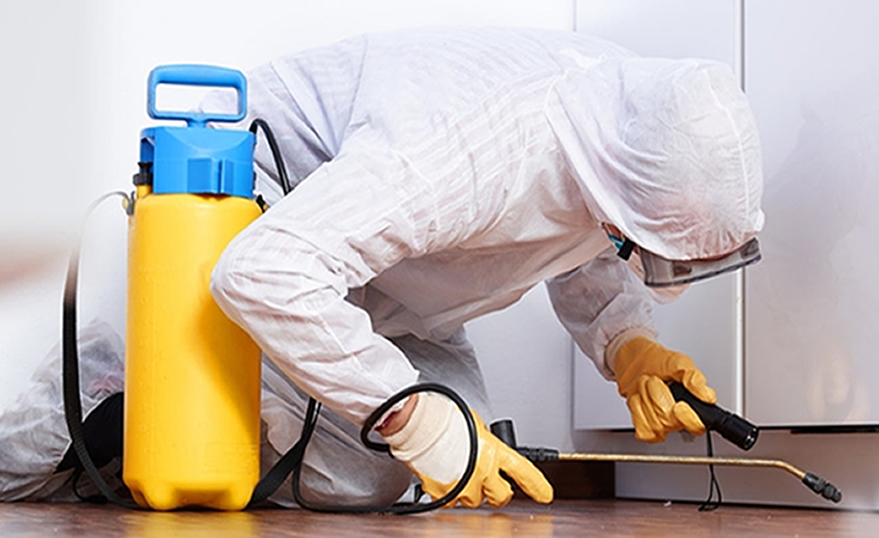Professional Bug Control Techniques for Long-Term Results
Specialist pest control strategies encapsulate a detailed approach that begins with a complete evaluation and evaluation, adhered to by specific insect recognition to comprehend their behavior patterns. The application of Integrated Insect Management (IPM) concepts, paired with eco-conscious treatments, forms the keystone of sustainable parasite removal.
Assessment and Evaluation
Upon entering a property for parasite control solutions, the preliminary step is a complete inspection and evaluation to recognize the extent of the infestation and establish one of the most efficient therapy plan. Expert insect control technicians are educated to thoroughly analyze the premises, seeking signs of bug activity such as droppings, chomp marks, nests, or any kind of structural damages. They will likewise evaluate the conditions that might be drawing in insects, such as food resources, water leakages, or access factors.

Pest Identification and Habits

In addition, comprehending the habits of the identified insect is crucial to applying reliable control actions. Knowing where parasites nest, what they feed on, and their activity patterns can aid pest control professionals devise approaches to eliminate them effectively.
Integrated Insect Administration (IPM)
Integrated Parasite Management (IPM) techniques combine several techniques to control and prevent pest problems in a lasting and eco-friendly way. pest control. By integrating approaches such as biological control, habitat control, adjustment of cultural methods, and making use of immune ranges, IPM aims to lessen making use of chemical pesticides
One of the key concepts of IPM is the emphasis on avoidance. This proactive technique includes monitoring pest populations frequently to spot any type of potential issues before they rise. By determining parasite problems early, pest control steps can be carried out swiftly and properly.
In addition, IPM promotes making use of non-toxic insect control approaches whenever feasible. This can include utilizing natural predators of the parasites, presenting valuable pests, or utilizing pheromones to disrupt mating patterns. By lowering dependence on chemical pesticides, IPM not only secures the environment yet additionally assists preserve an equilibrium in the community.
Environmentally-Friendly Therapies
Carrying out eco-conscious techniques in pest control procedures can effectively resolve invasions while focusing on environmental sustainability. Environmentally-friendly treatments concentrate on reducing the effect of pest control techniques on ecosystems, redirected here non-target microorganisms, and human wellness.
Another key aspect of environmentally-friendly therapies is making use of natural and naturally degradable items that damage down rapidly without leaving hazardous residues in the environment. Herb insecticides originated from plants like chrysanthemums or neem supply effective parasite control while posturing very little danger to non-target species. Using approaches like warm therapies or pheromone traps can target details parasites with precision, reducing the overall ecological effect of insect control methods.
Recurring Surveillance and Maintenance
Continual security and upkeep are vital components of efficient insect control management. Ongoing tracking plays a crucial role in making certain that pest problems go now are found very early and managed quickly. Routine inspections by qualified professionals are needed to recognize any indications of bug task, evaluate the performance of previous therapies, and make changes to the bug control strategy as needed. By checking parasite populaces in time, parasite control professionals can track patterns, anticipate possible issues, and apply preventative steps to decrease the risk of future invasions.
In enhancement to monitoring, maintenance practices are vital for long-lasting parasite control success. This includes applying appropriate sanitation steps to get rid of prospective food and helpful hints water sources for pests, sealing off access points to prevent parasites from entering the premises, and resolving any architectural concerns that might assist in parasite problems (pest control). By incorporating ongoing monitoring and upkeep into an incorporated bug monitoring strategy, services can guarantee a pest-free setting and secure their home versus pricey damages and health threats
Conclusion
To conclude, using specialist bug control strategies such as complete inspection and analysis, accurate insect recognition and understanding of their actions, incorporated bug administration approaches, environmentally-friendly treatments, and continuous monitoring and maintenance are essential for achieving long-lasting cause insect control. By executing these approaches, individuals can properly handle bug problems and maintain a pest-free atmosphere in a lasting fashion.